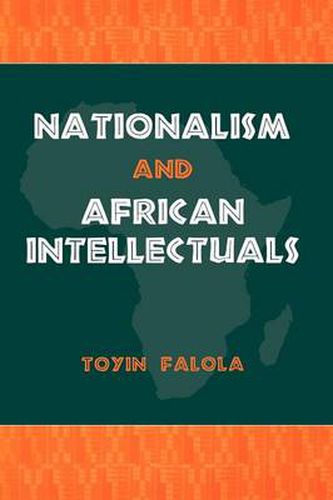Readings Newsletter
Become a Readings Member to make your shopping experience even easier.
Sign in or sign up for free!
You’re not far away from qualifying for FREE standard shipping within Australia
You’ve qualified for FREE standard shipping within Australia
The cart is loading…






(This book) clearly rests on extensive and carefully evaluated evidence and intellectual experience. CHOICE One of Africa’s most prolific historians offers here reflections on modern African intellectual life to inform contemporary debates. INTERNATIONAL JOURNAL OF AFRICAN HISTORICAL STUDIES This book is about how African intellectuals, influenced primarily by nationalism, have addressed the inter-related issues of power, identity politics, self-assertion and autonomy for themselves and their continent, from the mid-nineteenth century onward. Their major goal was to create a ‘better Africa’ by connecting nationalism to knowledge. The results have been mixed, from the glorious euphoria of the success of anti-colonial movements to the depressing circumstances of the African condition as we enter a new millennium. As the intellectual elite is a creation of the Western formal school system, the ideas it generated are also connected to the larger world of scholarship. This world is, in turn, shaped by European contacts with Africa from the fifteenth century onward, the politics of the Cold War, and the subsequent collapse of the Soviet Union. In essence, Africa and its elite cannot be fully understood without also considering the West and changing global politics. Neither can the academic and media contributions by non-Africans be ignored, as these also affect the ways that Africans think about themselves and their continent. Nationalism and African Intellectuals examines intellectuals’ ambivalent relationships with the colonial apparatus and subsequent nation-state formations; the contradictions manifested within pan-Africanism and nationalism; and the relation of academic institutions and intellectual production to the state during the nationalism period and beyond. Toyin Falola is the Nalle Centennial Professor of History at the University of Texas at Austin.
$9.00 standard shipping within Australia
FREE standard shipping within Australia for orders over $100.00
Express & International shipping calculated at checkout
(This book) clearly rests on extensive and carefully evaluated evidence and intellectual experience. CHOICE One of Africa’s most prolific historians offers here reflections on modern African intellectual life to inform contemporary debates. INTERNATIONAL JOURNAL OF AFRICAN HISTORICAL STUDIES This book is about how African intellectuals, influenced primarily by nationalism, have addressed the inter-related issues of power, identity politics, self-assertion and autonomy for themselves and their continent, from the mid-nineteenth century onward. Their major goal was to create a ‘better Africa’ by connecting nationalism to knowledge. The results have been mixed, from the glorious euphoria of the success of anti-colonial movements to the depressing circumstances of the African condition as we enter a new millennium. As the intellectual elite is a creation of the Western formal school system, the ideas it generated are also connected to the larger world of scholarship. This world is, in turn, shaped by European contacts with Africa from the fifteenth century onward, the politics of the Cold War, and the subsequent collapse of the Soviet Union. In essence, Africa and its elite cannot be fully understood without also considering the West and changing global politics. Neither can the academic and media contributions by non-Africans be ignored, as these also affect the ways that Africans think about themselves and their continent. Nationalism and African Intellectuals examines intellectuals’ ambivalent relationships with the colonial apparatus and subsequent nation-state formations; the contradictions manifested within pan-Africanism and nationalism; and the relation of academic institutions and intellectual production to the state during the nationalism period and beyond. Toyin Falola is the Nalle Centennial Professor of History at the University of Texas at Austin.